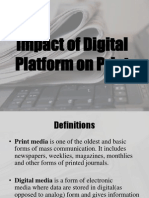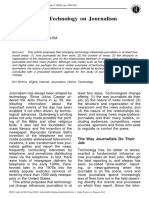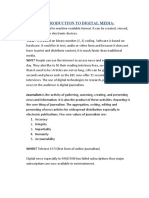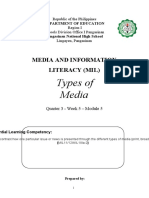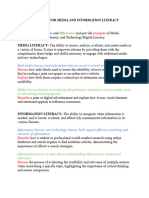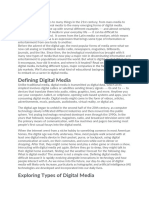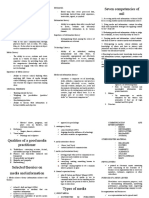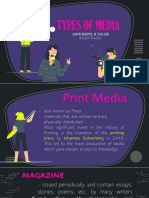Introduction to Digital Media
Digital media is a type of media which covers content & promotions delivered
through digital platforms including electronic media, mobile phones, computers,
podcasts, applications etc. Companies & people use digital media for various
purposes including information source, entertainment, games, business etc. It
provides a very useful platform from the business perspective.
Digital media is digitized content that can be transmitted over the internet or
computer networks. This can include text, audio, video, and graphics. This means that
news from a TV network, newspaper, magazine, etc. that is presented on a Web site
or blog can fall into this category.
Florida’s digital media industry Association, digital media Alliance Florida,
defines digital media as the creative convergence of digital arts, Science,
technology and business for human expression, communication, social
interaction and education.
Most digital media are based on translating analogue data into digital data. The
Internet began to grow when text was put onto the Internet instead of stored on papers
as it was previously. Soon after text was put onto computers images followed, then
came audio and video onto the Internet.
Characteristics of Digital Media
Net, a valuable source
Both print and digital journalists are yet to discover the power that the effective
use of search engines may unleash. I have studied the evolution of digital media since
1986.
The World Wide Web has valuable sources of information that are never used by the
media.
Many citizens are experts in various fields and would love to take part in public
debate. Journalists researching for news stories can find new and authentic sources on
the Net, especially in the blogosphere.
Work process
The work processes in print and digital journalism are similar on the surface. They
both involve the generation of ideas, research, presentation and evaluation. But with
the evolution of digital journalism, the biggest change can be seen in researching a
story.
�The web as a potential and reliable source of information has drastically changed the
way journalists think and work.
The journalistic work process is updated and revolutionised by the digital media.
Storytelling is changing drastically and the media has a range of new methods to
measure reactions and feedback from the public. Together, these changes have the
potential to improve the quality of all forms of journalism.
Constant evaluation
Thanks to the Internet, journalists may find and verify their stories easily at work.
The readers are constantly evaluating the stories published in the digital media and
are adding more information or pointing out mistakes or improvements.
The most important change, however, is from bloggers and citizen journalists who
share information and knowledge. They update news and information instantly, for
example, through Twitter, a micro-blogging service.
After the story has been published, journalists look for the number of hits their story
has got to see how popular it is with readers. By reacting to mistakes or inaccuracies,
readers help to make news stories read better and better.
Such is the potential of digital journalism.
Blogs are evolving into a powerful medium and in countries such as Iran and Syria,
they are the only reliable source of information. But even in India and in Europe,
blogs are supplementing the established news media.
Today, it is not very uncommon to see bloggers becoming journalists or newspapers
inviting bloggers to write columns.
This trend is precisely due to the immense popularity of some of the bloggers.
The biggest advantage of blogging is that it can renew journalism by bringing in new
voices, ideas and concepts.
Advanced search
Learning advanced search techniques is vital for journalists. They need to develop a
very good understanding of how the search engines work. Search engines are
dynamic tools and can lead to new sources for news stories.
For example, when a group of students at a ACJ workshop were asked to find more
information on the raging Mullaperiyar dam issue, they were able to track down
�authentic information on details pertaining to various aspects of the dam and other
unknown facts and figures that were shared by bloggers.
Thus the students were able to come up with a very informative news story based on
the information they gathered using advanced search techniques. Vibrant and
spontaneous
Only when journalists are from varied backgrounds will their work be spontaneous
and enthusiastic.
The reason why blogs are interesting is mainly because bloggers are from various
walks of life.





